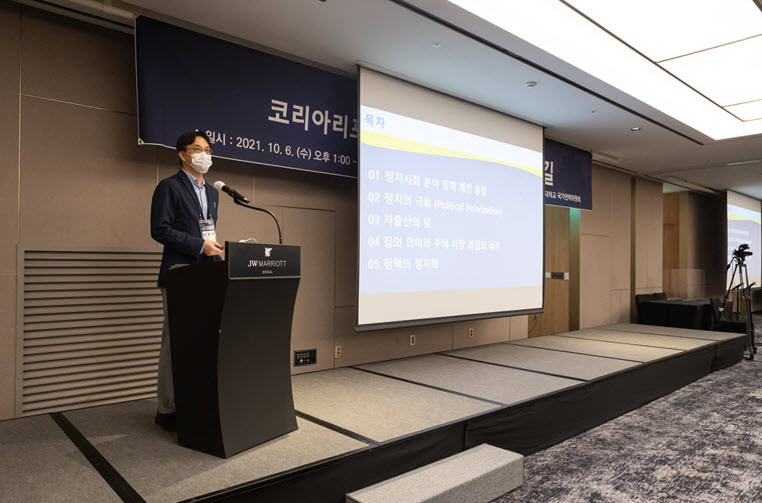On Wednesday, October 6, the 18th National Policy Forum was held by Seoul National University’s National Strategy Committee. The National Policy Forum has addressed topics that largely affect the overall society, such as the impeachment of the president, the extinction of rural areas, and COVID-19. In this year’s event, experts discussed solutions to social issues that need to be addressed prior to next year’s presidential election. Presentations were given in the following order: politics and sociology, international and North-South Korean relations, health and medicine, science and technology, education, economy/employment/social welfare, autonomy and decentralization, social security, and carbon neutrality and climate change.

Professor Park, Won-Ho (Department of Political Science and International Relations) of the politics and sociology sector
Continued Policy Proposals on Political, Medical, and Educational Issues
Professor Park, Won-Ho (Department of Political Science and International Relations) of the politics and sociology section, was the first speaker. He argued that the most critical issues the Korean society faces today are political polarization, low birth rate, and an excessive boom of the housing market. As a solution to political polarization, Park proposed the need for a law reform to relax restrictions on the establishment of new political parties. This way, more political parties will exist in the nation to prevent the polarizing side-effect of the ongoing two-party system. For the low birth rate, he mentioned that low income is a leading factor, as shown in statistics. Therefore, Park stressed that increasing the minimum wage is an effective solution. Finally, he mentioned that the main reason for the housing market boom is panic buying. Park proposed that to eradicate this bandwagon effect, effective communication between the state and its citizens should take place during the implementation of real estate policies.
The presentation of the health and medicine section conducted by Professor Park, Do Joon (Department of Medicine) also received considerable attention, due to heightened interest following COVID-19. Park pointed out that although in the beginning of the pandemic the South Korean government’s response was considered effective, in the following months there was public confusion about vaccination and social distancing measures. He stated that the reason for the confusion was an absence in communication regarding public health, and proposed a compact communication channel among various entities, including the government, experts, citizens, and the media. Park especially ordered that the government respect expert opinion and actively provide citizens with sufficient information. Moreover, he pointed out that to cope with potential infections in the future, the role of local public health centers which are in charge of grass-roots medicinal practices must be strengthened to become the core of the public health system.
The presentation by Professor Shin, Jongho (Department of Education), which put emphasis on the role of the Ministry of Education and universities, was also significant to the members of the university.
Professor Shin emphasized the need for policies that focus on reinforcing undergraduate education to increase the competitiveness of university education. In addition, he proposed the establishment of an educational institution specializing in big data and the fostering of instructors possessing diverse experiences. For the introduction of such an innovative educational model, adequate autonomy must be given to universities and sufficient funding must be provided.
SNU Designs the Future Together with the Society
At the round table, experts from diverse fields gave feedback to proposals by the National Strategy Committee.
Lee Seok-Jun, a policy consultant from the presidential campaign of Yoon Seok-youl, thanked the committee for setting forth in-depth and concrete policy proposals, saying that he will consider the suggestions in future policies.
Park Soon-Sung, vice policy director from the presidential campaign of Lee Jae-myung, also stated that they would actively reflect upon the content of this forum, leaving room for additional communication with the researchers afterwards. “The competitiveness of a think tank is directly connected to that of a nation,” Ahn Hyun Sil, editorial writer of The Korea Economic Daily, said, assessing the role of the National Strategy Committee as a university-affiliated think tank.
Professor Hong Joonhyung (Graduate School of Public Administration) is a member of the National Strategy Committee. “Since policy agendas are difficult to resolve with a short discussion, there were some differences among the researchers. However, we will continue to revise them,” he said. Active communication between policy creators and university researchers is expected to help further SNU’s social responsibility in the future.
This National Policy Forum was also a briefing session for Korea Report 2022, written by the National Strategy Committee. Korea Report will continue to be published every year to diagnose the present state of South Korea and guide new policies. Previous forums can be viewed on the SNU YouTube channel (https://www.youtube.com/c/SeoulNationalUniversity).
Source: https://www.snu.ac.kr/snunow/snu_story?md=v&bbsidx=133639
Written by Seunghwan Oh, SNU English Editor, ascendhwan@snu.ac.kr
Reviewed by Professor Travis Smith, Department of Asian Languages and Civilizations, tlsmith@snu.ac.kr

